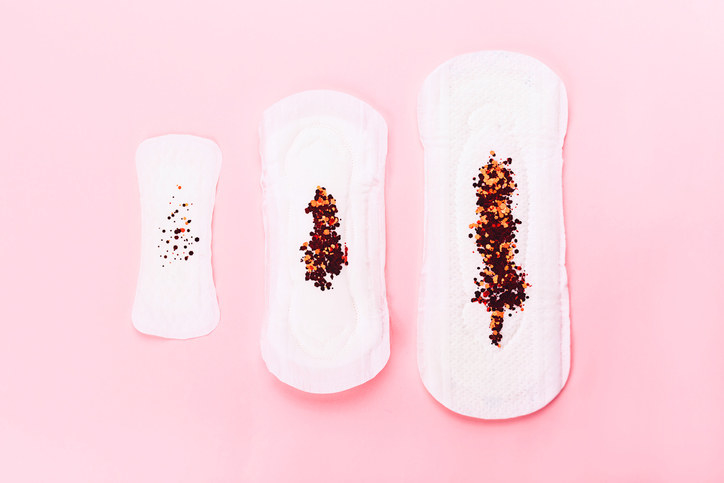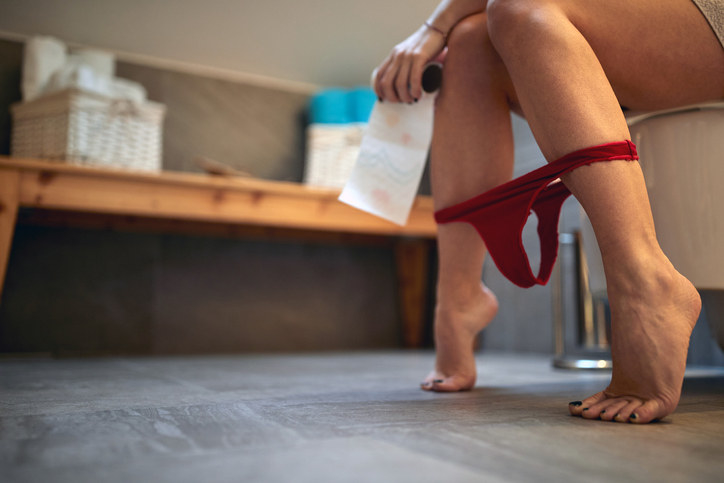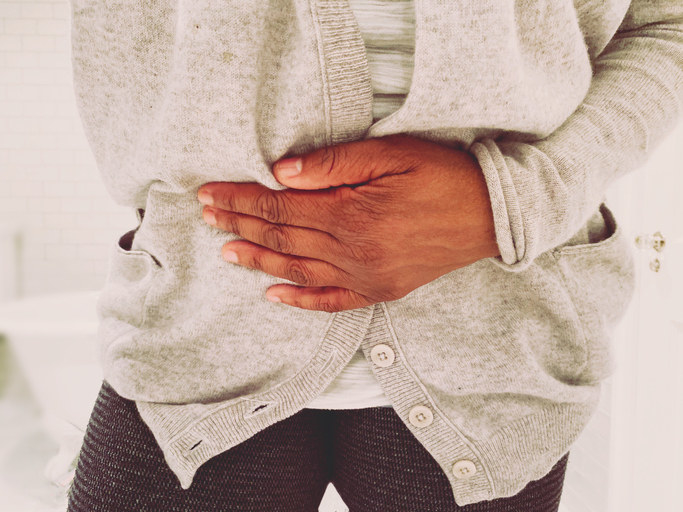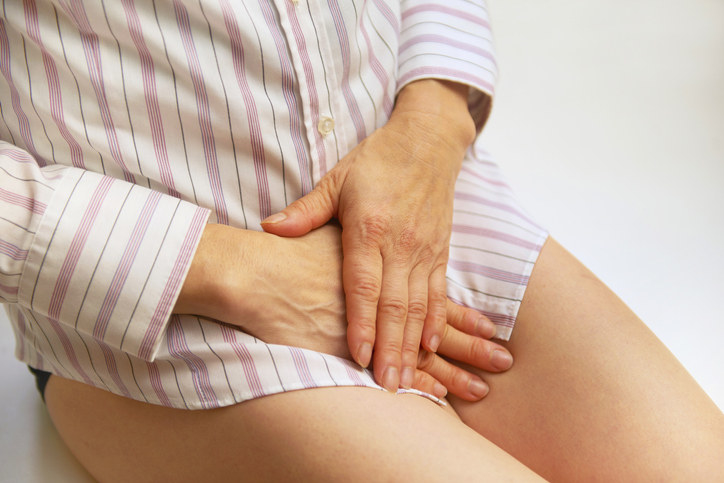We asked the BuzzFeed Community if they ever had a question about ~down there~ that they might be too embarrassed or intimidated to ask, and they came through with lots of insightful questions! So, we reached out to Dr. Heather Jeffcoat, DPT, a licensed pelvic floor physical therapist and owner of Femina Physical Therapy in Los Angeles, to answer your pelvic health inquiries.
Here's what she had to say:
1. "Why do I have to pee so often? I barely drink any liquids throughout the day, because otherwise I’d be peeing even more than I already am."
Dr. Jeffcoat: Patients will often tell me they restrict their fluid intake in order to reduce their urinary frequency, and are surprised when they have to pee more often. This happens because when you restrict your fluid intake, your urine becomes more concentrated, which acts as an irritant to your bladder, much in the same way that alcohol, and spicy or acidic food and drink will affect your bladder.
2. "Is blood normal after sex? I'm enjoying my partner, I’m always lubricated, and we use more lube on top of that! Is spotting from my vagina normal after penetration?"
Dr. Jeffcoat: The general answer is no, but it may or not be cause for immediate concern. If the blood is coming from the tissue at the entrance to the vagina (the vulva), seeing a pelvic floor physical therapist to help improve the muscle and tissue mobility in the area can help. The most common place this occurs is at the 6 o’clock position, or at the “bottom” of the vaginal opening (the part closer to the skin that separates the anus from the vagina).
However, there could be other issues that should be ruled out by a physician first, such as hormonal issues affecting the vulvar tissue, or lichen sclerosus, both of which have to be managed medically. If the blood is coming from inside the vagina, this should always be looked at by your physician to rule out polyps, cervical issues (including cancer), sexually transmitted infections, or other medical causes.

3. "Why do I get period-like cramps after I orgasm? They make me not want to orgasm at all! What can I do to relieve that pain?"
Dr. Jeffcoat: Period-like cramps can come from a variety of sources. First, it could be cramping of your uterus. Although thought to be rare, some women do experience uterine orgasms, which are thought to occur from stimulation to the cervix. If this is a consideration, I recommend a product such as the OhNut to minimize cervical stimulation by limiting the depth of penetration by your partner.
Deep cramping that feels similar to period cramps may also be due to the contraction of the pelvic floor muscles, as they are involved in the orgasm response. If there is already overactivity of these muscles at baseline, further contraction of the already short and tight muscle can cause it to cramp. The answer is seeking a pelvic floor physical therapist to help guide you on a program to treat those involved muscles, both in-office and independently at home. In some cases, a skilled physical therapist may be able to instruct the self-treatment program via telehealth as well.
4. "Why does my bladder always wake me up to pee after a certain amount of hours of sleep, and can I train it to stop?"
Dr. Jeffcoat: Yes, you can absolutely re-train your bladder to stop waking you in the middle of the night. Pelvic floor physical therapists treat this symptom, medically termed Nocturia. The first step is trying to minimize your fluid intake within two to three hours of your bedtime. This also includes minimizing bladder irritants such as spicy foods, food and drinks with citric acid, alcohol, and caffeinated beverages. Many patients who wake at night to pee also have daytime urinary frequency issues. You shouldn’t have to pee more than five to eight times per day, and not at all through the night, unless you're on a medication, such as a diuretic, that will make you have to go more often. Controlling daytime frequency will often carry over into reduced bladder sensitivity overnight.

5. "How can I stop having painful penetrative sex, and would a pelvic floor therapist help? If so, do I need a referral from my OB-GYN to see one?"
Dr. Jeffcoat: A pelvic floor physical therapist is a crucial part of your care team if you're experiencing painful penetrative sex. Many states allow Direct Access for receiving a physical therapy evaluation and treatment. However, most offices that specialize in pelvic health still require medical clearance from a physician, since pelvic health specialists can’t test for infection, hormonal insufficiencies, or other medical causes of your pain. Many patients will come to my office and say, "My doctor couldn’t find anything wrong with me," which usually means the muscles and tissue in the area are contributing to the problem. This is exactly what a pelvic floor physical therapist will address. To find one in the US, you can visit the Academy of Pelvic Health Physical Therapy’s “Find a PT” locator.
If you're located internationally, there are physicians and physical therapists that specialize in treating sexual dysfunction and chronic pelvic pain that are a part of the International Pelvic Pain Society, and you can find them here.
I also wrote a book on this, and it’s available at Amazon and other retailers.
6. "I have intense pain in my (internal) urethra area that comes and goes. It usually happens if I lay on my side with one leg on top of the other, but can happen in any position or anytime. What could this be? It isn’t a UTI or any normal infection."
Dr. Jeffcoat: If a UTI or other infection has been ruled out, this could be a sign of painful bladder syndrome (previously known as interstitial cystitis or IC) or a suburethral cyst. Painful Bladder Syndrome presents as bladder and/or urethral pain, and has been shown to be helped with dietary changes (like reducing bladder irritants), behavioral modifications, and manual therapy performed by a pelvic floor physical therapist. The American Urologic Association also recommends these as the top lines of treatment for painful bladder syndrome.
Suburethral cysts also present as urethral pain, and can be surgically managed by a urologist or urogynecologist prior to participating in pelvic floor physical therapy, if pelvic floor dysfunction is still present post-operatively.

7. "What is truly the best way to fix pelvic floor weakness/incontinence after pregnancy? Pelvic floor PT is cost-prohibitive, and kegels are so tedious and seem to only be effective if you do them with perfect consistency for months, and possibly years on end."
Dr. Jeffcoat: If you're asking for the best way, it’s seeing a licensed pelvic floor physical therapist, because they're equipped to let you know if your muscles are weak because they're lengthened, weak because they're short and overactive, or at a normal length and just weak! Just because someone has symptoms of bladder or bowel leakage, or pelvic organ prolapse, that doesn't mean they should be doing kegels. All voluntary or skeletal muscle — which the pelvic floor muscles are — have a different ability to produce force depending on their length. An overly lengthened muscle is weak, but so is a short/tight muscle. If you have short/tight pelvic floor muscles, then you should be stretching and releasing your pelvic floor before strengthening it.
I do understand the inaccessible nature of pelvic floor physical therapy both financially and geographically for many, and have a personal mission to improve accessibility locally (and one day, nationally). However, the reason for your dysfunction may be complex, and unfortunately there's no magic formula or quick fix in many cases.
Note: If you're looking for a more accessible version of pelvic floor PT, you can also try Pelvic Gym! It's an online platform that offers expert-led pelvic floor video content at home for only $10 a month. Our readers can get a whole month free if they sign up using this link.
8. "When I go swimming or have a bath, my vagina always seems to, like, fill up with water? Should I be worried?"
—Anonymous
Dr. Jeffcoat: This isn’t a medically concerning issue, but could be uncomfortable or create unpleasant noises when you get out of the bath or pool. What you're experiencing could go beyond pelvic floor strengthening, and may need surgical intervention. So, it’s best to review your options with your pelvic floor physical therapist and urogynecologist.

9. "What should I use to clean my vagina? I’ve heard so many different things over the years — Summer's Eve, unscented soap, just plain water — but what’s the right answer?"
—Anonymous
Dr. Jeffcoat: Let’s clarify the anatomy here: The vagina is inside your body, and your vulva is your external genitalia. Nothing needs to be put in your vagina to clean it. It actually cleans itself, and you don’t want to disrupt the natural bacterial flora that exists there. The vulva can just be cleaned with run-off from your normal soap, but if you have vulvar irritation, avoid using soap on that area, or use something that's fragrance-free and natural to avoid chemical irritants.
10. "I sometimes suffer from situations where I suddenly feel like I REALLY need to pee and can't always get to the toilet in time. I used to hold my pee in when I was younger a lot, so I think that's probably responsible. Any advice on how to make this sort-of-embarrassing incident less likely?"
—Anonymous
Dr. Jeffcoat: When these sudden urges come on, your bladder is starting to contract to pee before you're in the appropriate place to do so. The pelvic floor muscles are wired to relax when your bladder contracts, but the accidental leakage in this situation can be retrained. To reduce the overriding urge sensation, first sit or stand still, and take two or three slow, deep breaths. As you're taking your last deep breath, start doing five quick pelvic floor contractions (aka kegels).
By contracting your pelvic floor muscles, you're telling your bladder to relax. Try to think about something other than the fact that you have to pee (like, what are you making for dinner? Where do you want to travel to next?). Do this alternate thought as you're doing the five quick contractions for best results. This causes the urge to subside a bit. Repeat that cycle as needed until the urge is suppressed enough for you to continue walking to the bathroom. Repeat these steps as needed all the way to the bathroom. With regular practice, you’ll typically notice better control within a week.
In many with this type of incontinence, the pelvic floor muscles are typically in an overactive resting state. This means that they also need pelvic floor manual therapy techniques to reduce the tension in these muscles. A pelvic floor physical therapist can help identify which muscles are overactive and instruct you in a home program to self-treat if you're unable to attend routine follow-up sessions.

11. "I have difficulty urinating after sex, since I'm unable to get my body to relax enough to release anything. I know I’m supposed to urinate after, but is there anything I can do if I physically cannot urinate until much later? Is there anything I can do to try to relax my urethra enough to be able to pee?"
—Anonymous
Dr. Jeffcoat: Try taking the focus away from your urethra, and instead focus on general relaxation. You can do this while sitting on the toilet:
1) Place your hands on the sides of your ribs. Take in a slow, five-second inhale. As you inhale, feel your ribs expand toward your hands. Visualize your lungs filling up with air and pushing your diaphragm downward.
2) Hold your breath for two seconds.
3) Slowly exhale for six to seven seconds.
4) Repeat step 1, but now add the visual on the inhale of your pelvic floor muscles dropping and getting soft or heavy (whatever visual seems most relaxing to you). Don't tell your muscles to “relax," as that rarely works.
5) Hold your breath for two seconds.
6) Slowly exhale for six to seven seconds, and visualize your pelvic floor slowly coming back up to its starting position, without tension or strain.
7) Repeat these breathing patterns and visuals for up to two to three minutes.
12. "Can wearing a kegel ball during daily activities (including chilling on the couch) weaken the pelvic floor muscles and lead to leakage?"
—Anonymous
Dr. Jeffcoat: Wearing a kegel ball is fine if your pelvic floor muscles have a normal resting length and tension, and a moderate amount of strength to support them. However, if your pelvic floor muscles are overactive, using a kegel ball only encourages them to become shorter and tighter, which will make them weaker. This weakness could lead to incontinence.

13. "I'm in my late 30s and have to wear a daily liner due to urine leakage! It's not a whole lot, but enough to dampen my underwear if I don’t wear a liner, and it smells of urine. It's so embarrassing, and I’m not even aware when it's happening. I'm hydrated and use the bathroom regularly, so I don’t know why it happens! Is there anything I can do to help this?"
—Anonymous
Dr. Jeffcoat: The first thing that should be checked is the sensory function of your perineal area. If this is intact and you're experiencing intermittent or constant leakage, you may have urethral hypermobility, or weak, underactive, or overactive pelvic floor muscles. Urethral hypermobility should be assessed by a urologist or urogynecologist. Overactive pelvic floor muscles are assessed by a pelvic floor physical therapist.
14. "I have endometriosis and PCOS, but despite that, my body (specifically in the pelvic region) feels SO MUCH BETTER after sex. And it's not just the endorphins from orgasm, because it's not the same when I'm doing it solo. My doctors can't figure it out. Any thoughts?"
—Anonymous
Dr. Jeffcoat: The pain presentation of folks with endometriosis and PCOS can vary so much from person to person. For some, intercourse makes their pain worse, and for others, as you mentioned, it makes it feel better. The mechanical stretching of your pelvic floor muscles that's occurring during sex could be providing this relief if your pelvic floor muscles are overactive (which they typically are with those diagnoses). You also may be stretching other surrounding muscles during sex that could be contributing to this relief vs. during solo play.
Another possible component is how you are feeling about your partner. Do you feel a sense of comfort and safety with them? Having this calm helps get your nervous system in a down-regulated state, which reduces the “volume” of the pain you're experiencing.

15. "I'm female-to-male, and I’ve noticed it’s very hard to let go and pee when standing up, and using a packer needs a lot of control. Can forcing myself to pee, and controlling it, do any damage?"
—Anonymous
Dr. Jeffcoat: I do not advise straining pee in any position. Doing so can lead to other voiding dysfunctions, such as urinary incontinence or delayed voiding. Those assigned female at birth are hard-wired to pee while sitting. To retrain this, start by peeing in the shower while standing. The warmth and water running will help the flow start easier. As the flow starts, tune in the relaxation you're feeling as you start and continue to pee. Next time you need to pee, see if you can replicate this same pelvic relaxation while standing at the toilet. But please, never strain.
16. "Can masturbation temporarily or permanently weaken the pelvic floor muscles and lead to leakage?"
—Anonymous
Dr. Jeffcoat: No. Quite the contrary, when you have an orgasm, part of this is a contraction of your pelvic floor. Pelvic floor muscle contractions correlate with the intensity and duration of the orgasm. If you're experiencing leakage, it's likely for a different reason.

17. "My pelvic area continuously cramps. I’ve mentioned it to my gynecologist, and she never says anything about it. Is there anything that could be causing me to cramp all the time?"
—Anonymous
Dr. Jeffcoat: If it isn’t your uterus and you’ve been ruled out for other possible causes — such as ovarian cysts — the next place to look is your pelvic floor muscles. A skilled pelvic floor physical therapist can identify the muscles that are contributing to your pain. The point of their examination should be to reproduce your pain. This pain could be coming from your pelvic floor muscles, but it also could be referred pain from other areas, such as the muscles in your hips, abdominals, or lower back.
18. "Can I resolve my pelvic floor dysfunction on my own without physical therapy? I got a prescription for pelvic floor PT because I have painful bladder syndrome, but their earliest available appointment is in March, and I don’t know what to do about my hypertonic pelvic floor."
—Anonymous
Dr. Jeffcoat: Painful bladder syndrome (formerly known as interstitial cystitis) often has a painful sex component in 48%–74% of cases. My book, Sex Without Pain: A Self-Treatment Guide to the Sex Life You Deserve, starts with an accessible program to identify anatomy and address pelvic floor muscle overactivity, typically found in both painful bladder syndrome and painful sex.
While it doesn’t cover the full program I teach patients related to painful bladder syndrome, it will get you on the right track to addressing your overactive pelvic floor muscles while you await your in-office session. My offices and others also offer telehealth, so additional guidance may be provided this way until you can be seen in person.
You can follow Dr. Jeffcoat on TikTok and Instagram and also check out her book for more pelvic health content. If you're looking for a pelvic floor physical therapist in the US, use this locator. For international providers, use this locator. Sign up for a free month of Pelvic Gym using this link. And if you'd like to see more posts like these, make sure to follow the BuzzFeed Community!
Questions and responses have been edited for length/clarity.

